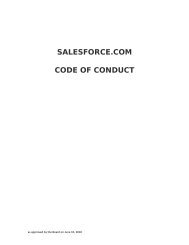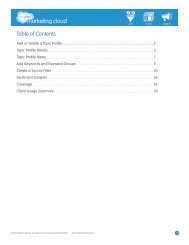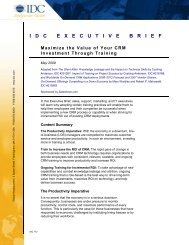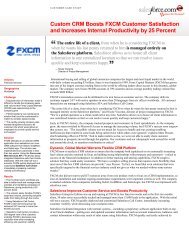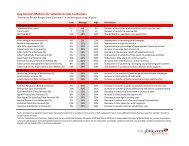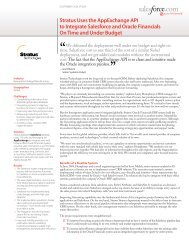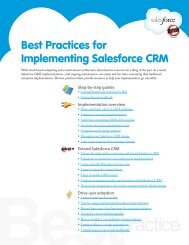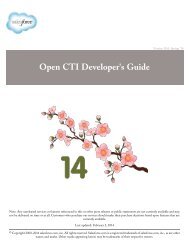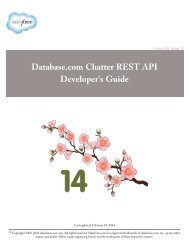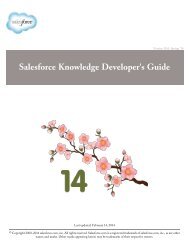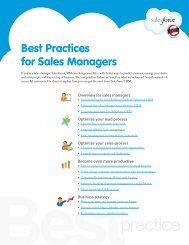Database.com Metadata API Developer's Guide - Salesforce.com
Database.com Metadata API Developer's Guide - Salesforce.com
Database.com Metadata API Developer's Guide - Salesforce.com
Create successful ePaper yourself
Turn your PDF publications into a flip-book with our unique Google optimized e-Paper software.
<strong>Metadata</strong> Types<strong>Metadata</strong> Type<strong>Metadata</strong><strong>Metadata</strong>WithContentMobileSettingsNamedFilterOwnerSharingRulePackagePermissionSetPicklist (IncludingDependent Picklist)ProfileQueueRemoteSiteSettingRoleSecuritySettingsSharingReasonSharingRecalculationSharingRulesValidationRuleAllows Wildcard (*)? DescriptionNoNoYesNoYes, for all typesexcept CustomObjects.NoYesNoYesYesYesYesYesNoNoSee entries forCriteriaBasedSharingRuleandOwnerSharingRule.NoThis is the base class for all metadata types. You cannot edit this object.A <strong>com</strong>ponent is an instance of a metadata type.This is the base type for all metadata types that contain content, suchas documents or email templates.Represents an organization’s mobile settings, such as mobile Chattersettings, whether Mobile Lite is enabled for an organization, and so on.This <strong>com</strong>ponent has been removed as of <strong>API</strong> version 30.0 and is onlyprovided for backward <strong>com</strong>patibility. The metadata associated with alookup filter is now represented by the lookupFilter field in theCustomField <strong>com</strong>ponent.Represents the metadata associated with a lookup filter. Use thismetadata type to create, update, or delete lookup filter definitions.Represents an ownership-based sharing rule. OwnerSharingRule enablesyou to share records owned by a set of users with another set, using rulesthat specify the access level of the target user group.Used to specify metadata <strong>com</strong>ponents to be retrieved as part of aretrieve() call, or to define a package of <strong>com</strong>ponents.Represents a set of permissions that's used to grant additional access toone or more users without changing their profile or reassigning profiles.You can use permission sets to grant access, but not to deny access.Represents a picklist (or dependent picklist) definition for a custom fieldin a custom object or a custom or standard field in a standard object.Represents a user profile. A profile defines a user's permission to performdifferent functions within <strong>Database</strong>.<strong>com</strong>.Represents a holding area for items before they are processed.Represents a remote site setting.Represents a role in your organization.Represents an organization’s security settings. Security settings definetrusted IP ranges for network access, password and login requirements,and session expiration and security settings.Represents an Apex sharing reason, which is used to indicate why sharingwas implemented for a custom object.Represents Apex classes that recalculate the Apex managed sharing fora specific custom object.Represents a set of sharing rules. SharingRules enables you to sharerecords with a set of users, using rules that specify the access level of thetarget user group.Represents a validation rule, which is used to verify that the data a userenters in a record is valid and can be saved. A validation rule contains aformula or expression that evaluates the data in one or more fields andreturns a value of true or false. Validation rules also include an errormessage that your client application can display to the user when therule returns a value of true due to invalid data.74



